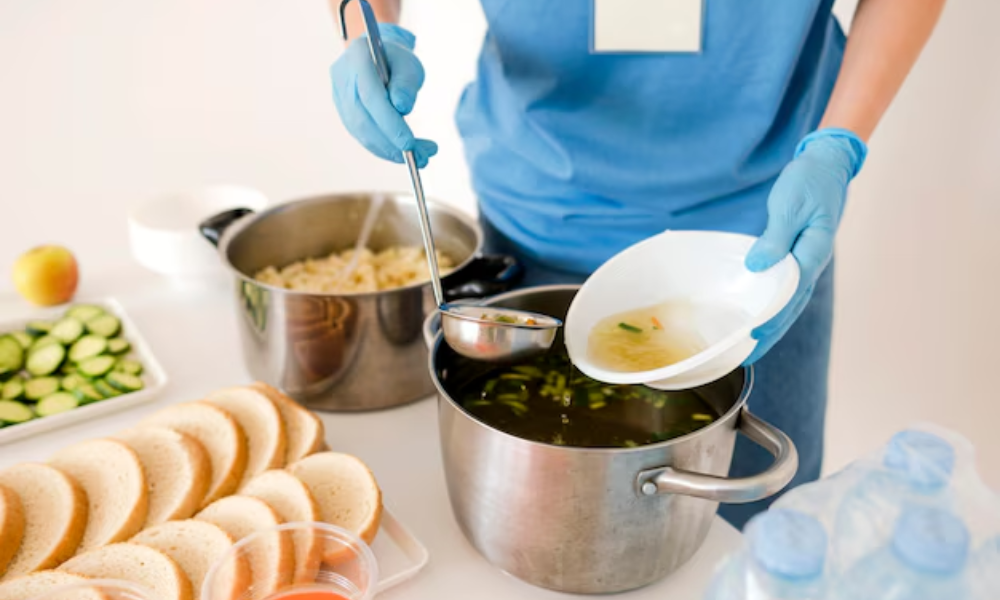Boarding schools in India play a significant role in shaping students’ health and well-being. Among the most critical aspects of ensuring student wellness is maintaining food safety and hygiene.
With hundreds of students relying on these institutions for daily nutrition, schools prioritize practices that guarantee safe, healthy, and hygienic food preparation and delivery.
The Importance of Food Safety and Hygiene

Why Food Safety Matters
Food safety and hygiene involve proper handling, preparation, and storage of food to prevent contamination and ensure nutritional value. In boarding schools, these practices are essential for several reasons:
- Student Health: Contaminated food can lead to illnesses like food poisoning, which negatively impact students’ health and academic performance.
- Parental Confidence: Parents trust schools to prioritize their child’s well-being, and ensuring food safety helps maintain this trust.
- Nutritional Integrity: Even the most nutritious meals lose their benefits if prepared or stored unhygienically.
Role of Healthy Food Options
Providing healthy and balanced meals is crucial for students’ development. Nutritious food enhances energy, immunity, and concentration, enabling better academic outcomes. Schools that prioritize food safety and hygiene ensure these benefits are not compromised.
How Boarding Schools Maintain Food Safety and Hygiene

1. Sourcing Fresh Ingredients
- Local Partnerships: Schools collaborate with local farmers for fresh produce, ensuring a steady supply of fruits, vegetables, and dairy.
- Certified Vendors: Grains, pulses, and other staples are sourced from certified suppliers to meet quality standards.
2. Hygienic Food Preparation
- Trained Staff: Kitchen staff receive regular training on hygienic practices and safe food handling techniques.
- Clean Workspaces: Dedicated areas for chopping, cooking, and plating prevent cross-contamination.
- Regular Sanitation: Kitchens and cooking equipment are sanitized multiple times daily.
3. Compliance with Food Safety Standards
Reputed schools comply with regulations set by bodies like the Food Safety and Standards Authority of India (FSSAI):
- Periodic Inspections: Internal and external audits ensure adherence to hygiene protocols.
- Food Testing: Ingredients and prepared meals undergo regular quality checks to detect contamination.
4. Proper Storage Practices
- Temperature Control: Refrigerators and freezers keep perishable items at safe temperatures.
- Sealed Containers: Airtight containers prevent pests and maintain food freshness.
- FIFO System: “First In, First Out” inventory management ensures older stock is used before newer supplies.
5. Safe Serving Methods
- Clean Dining Areas: Tables and serving stations are sanitized after every meal.
- Hygienic Serving Practices: Staff wear gloves, aprons, and hairnets while handling food.
- Supervised Meals: Teachers and wardens monitor meals to address concerns and encourage healthy eating habits.
Advanced Measures for Food Safety and Hygiene

1. Technology in Food Safety
- Automated Kitchens: Many boarding schools use automated cooking equipment to ensure consistency and hygiene.
- Temperature Sensors: Storage units are equipped with sensors to monitor and maintain proper temperatures.
- Digital Records: Schools keep digital logs of inspections, meal plans, and ingredient sourcing for better traceability.
2. Customized Meal Plans
Modern schools cater to diverse dietary needs:
- Allergy Awareness: Separate preparation areas and labeling for allergen-free meals.
- Special Diets: Vegan, gluten-free, and calorie-specific meal options ensure inclusivity.
3. Sustainability Practices
- Waste Reduction: Composting leftover food minimizes waste while promoting environmental sustainability.
- Portion Control: Serving appropriate portions reduces wastage and encourages mindful eating.
Educating Students About Food Safety and Hygiene

To instill lifelong healthy habits, boarding schools focus on student education:
- Nutrition Workshops: Experts teach students about balanced diets and safe food handling.
- Kitchen Gardening: Some schools involve students in growing vegetables, helping them understand the farm-to-table journey.
- Personal Hygiene Awareness: Students are educated on washing hands before meals and maintaining clean eating habits.
Challenges in Maintaining Food Safety

Despite significant efforts, schools face challenges in ensuring food safety and hygiene:
- Large-Scale Operations: Managing meals for hundreds of students requires careful planning and resource allocation.
- Training Gaps: Frequent training for staff can be time-intensive.
- Cost Constraints: Advanced food safety measures can be expensive for schools in remote areas.
Collaborative Efforts with Parents

Parents play a crucial role in reinforcing food safety and hygiene standards:
- Feedback Mechanisms: Regular input from parents helps schools address gaps in food safety practices.
- Joint Initiatives: Schools and parents collaborate on awareness campaigns to encourage healthy eating habits at home and in school.
Conclusion
Boarding schools in India recognize the indispensable role of food safety and hygiene in nurturing healthy, happy, and successful students. By implementing stringent practices, leveraging technology, and fostering awareness, these institutions set a high standard for nutrition and cleanliness.
Ensuring food safety not only protects students’ health but also contributes to their holistic development. With continued efforts and innovations, Indian boarding schools are paving the way for a brighter, healthier future for their students.









